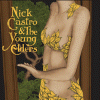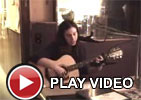Nick Castro and the Young Elders, "Come Into Our House"
 So many bands are incestuous that using a term like "supergroup" seems meaningless more and more. Nick Castro's third album utilizes the likes of Joolie Wood, Jon Contreras, Brian Dyson, and B'eirth. All in all, representatives from Current 93, In Gowan Ring, Damo Suzuki's Network, and Cul de Sac make an appearance, but the recorded outcome of this gathering is less than super.
So many bands are incestuous that using a term like "supergroup" seems meaningless more and more. Nick Castro's third album utilizes the likes of Joolie Wood, Jon Contreras, Brian Dyson, and B'eirth. All in all, representatives from Current 93, In Gowan Ring, Damo Suzuki's Network, and Cul de Sac make an appearance, but the recorded outcome of this gathering is less than super.
Strange Attractors
Continuing the annoying trend of "free-folk" hipsterism is Castro and his medieval band of merry marauders. The Young Elders come from a wide array of musical backgrounds and one would expect this fact to influence the sound and continuity of the record. Instead, Castro sticks to using unconventional instruments in familiar ways. There's a reason that knights in shining armor and damsels in distress come to mind when this album fires up and it's not because the record is imaginative. In many cases it mimics stereotypes about some period music that everyone should be familiar with. Hollywood has made it easy to recognize what some sounds are supposed to emulate. It is impossible to create genuinely medieval music because we aren't living in medieval times and, as a very smart man once said, all music is folk music because all music is made by people. As a result, these songs can be nothing more than new voices looking back at stereotypical examples of music most people never got to hear anyhow. These two facts situate this album somewhere between fanciful adoration for a series of instruments that belong most strongly to a certain period and poor reproduction meant to express the ideas of a musician who lives in the 21st century.
I'm quite familiar with the fact that Current 93, Six Organs of Admittance, and many other bands I enjoy use "folk" music and "medieval" conventions to mold their sometimes unique sound, but there is a difference between someone like David Tibet and Nick Castro. While Tibet joyfully exudes his love for histrionics and period instruments, he also leaves an impression of himself on the music that gives it character, a shine that is impossible to find elsewhere. Castro, on the other hand, merely reproduces what everyone is already familiar with. The music is absolutely gorgeous, the musicians involved have all had their hand in performing lovely ballads, intricate instrumentals, and shimmering bits of harp and recorder driven melancholy. Aside from that beauty, however, is nothing new with which to become enamored. A song like "Altar" sounds festive, bringing to mind all manner of fairs, competitions, and heavy drinking, but it also reminds me of Robin Hood in a bad way. This brings me back to the whole "free-folk" association: Castro is neither free nor folk. His music is emulative, an attempt to incorporate the past with the present and a stab at tackling some very well arranged music that positively shines with beautiful melodies and unusual instruments. There are no free form jams nor drones of guitar work that claim to have their heritage in jazz music. There's plenty of unusual instruments that feature elegant performances and soothing bits involving cello, oud, harmonium, and harp, but there's nothing particularly experimental or unusual about any of it. It all sounds very, very familiar most of the time.
If any of the names on this record float your boat, then chances are this record will be of interest. The songs aren't bad, they aren't poorly written, and with all the talent in the band it goes without saying that everyone plays quite well together. I can't help but feel that this is just another album in a long line of "folk" records, though. "Folk" records that have absolutely nothing to do with folk music (as in Nick Drake) and even less to do with free form music (as in John Coltrane and Derek Bailey). It's pretty, but there's plenty of it to be found everywhere.
samples:



